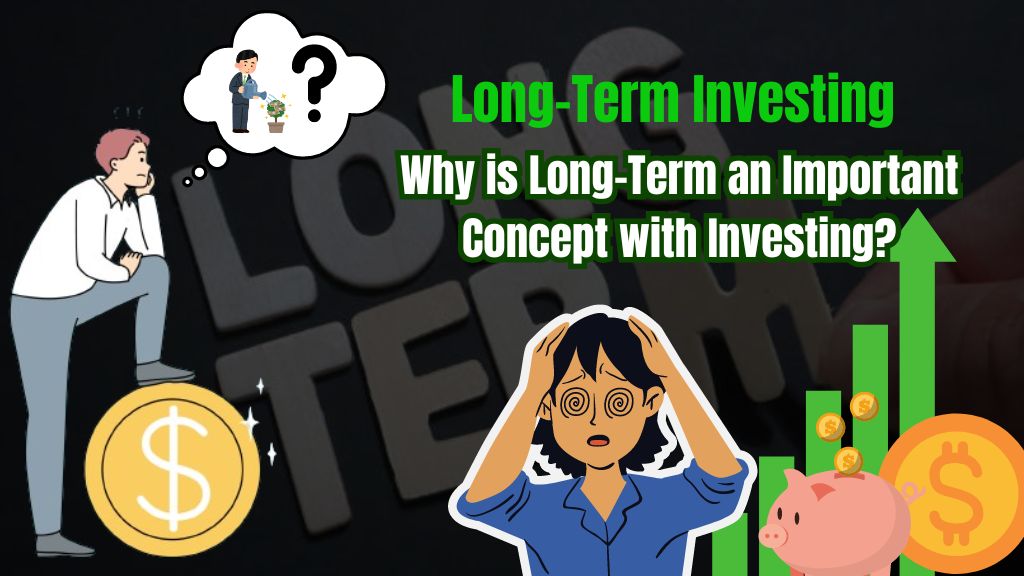Investing can be an exciting yet daunting venture, especially for beginners. Long-term investing is one of the most important financial concepts because it enables investors to manage risk and optimize returns efficiently. If you want to know “Why is long-term an important concept with investing”? Let’s explore the importance of long-term investing in this article.
Key Takeaways
Long-term investing leverages the power of compounding for exponential growth.
Holding investments for the long term can lower your tax burden.
Long-term encourages a more rational approach to investing.
Long-term investing is ideal for major financial milestones like retirement or education.
It reduces the impact of short-term market fluctuations.
What is Long-Term Investing?
Holding an asset for a long period, such as a stock or bond, is called “long term.”. Assets can last one year to 20 years or more, depending on type. Long-term investing means holding an investment for at least seven to ten years for some people.
There are no strict rules about this, but the idea is that by keeping an investment for a longer time, you might have a better chance to see its value grow. Because the market can go up and down a lot in the short term, but over a longer period, it tends to grow. So, when people talk about long-term investing, they usually mean being patient and selling quickly.
What is the Concept of Long Term Investment Decision?
When we discuss investing, one term that frequently comes up is long-term. But, why is long-term an important concept with investing? To understand this, let’s break down the concept and explore its significance.
Better Returns
An asset class is a group of investments that are similar to each other, Examples include stocks and bonds. Your age, risk tolerance, investment goals, and the amount of money you have to invest will all influence which asset class is ideal for you.
Historically, stocks have been the best option for long-term investors. It has outperformed other asset classes in terms of returns over the long term. For example,
| Asset | Return(%) | Period | Notes |
| S&P 500 | 9.80% | 1920-2023 | Represents 500 major US companies. |
| 10-year Government Bonds | 4.86% | 1920-2023 | Stable but lower returns compared to stocks. |
| Short-Term Government Bonds | 3.30% | 1920-2023 | Safest investment option with the lowest returns. |
| Gold | 6.55% | 1920-2023 | Serves as a hedge against inflation but lower returns than stocks. |
| MSCI Emerging Market Index | 2.66% | Last 10 years | Serves as a hedge against inflation but has lower returns than stocks. |
Experience Ups and Downs
Investing is a rollercoaster full of ups and downs. Long-term market fluctuations can be caused by a variety of variables, including changes in the economy, business performance, and world events, which can result in your investments both rising and falling.
Patience and staying focused on your goals are essential to long-term investing. Although short-term price declines can be disturbing, history shows the S&P 500 for 20 years often results in positive returns, even after major setbacks like the Great Recession and financial crises. For example,
| Event | Impact on Stock Market | Outcome for Long-Term Investors |
| Great Recession (2008) | Significant market downturn | The sharp decline in stock prices |
| Black Monday (1987) | 22% drop in a single day | Long-term investors regained losses and earned returns |
| IT Boom and Bust (2000s) | Tech stock volatility | Many tech stocks stabilized and grew over time |
| Financial Crisis (2007-08) | Sharp decline in stock prices | Markets rebounded, benefiting those who stayed invested |
Less Emotional But More Attractive Decisions
To be honest, we are not as balanced and logical as we believe. Emotionally charged investors often say they will be in it for the long run until the market crashes. Then, they retreat to prevent further damage. The reason for their poor results is that they are not reinvesting most of the profits after earning them and are missing the market boom.
| Metric | Value | Reason for Difference | Lesson for Investors |
| S&P 500 Average Annual Return | 9.65% | Reflects market performance over the period | Markets generally grow over time: staying invested is key |
| Average Investor Return | 6.81% | Reflects market performance over the period | Markets generally grow over time: staying invested is key |
| Difference | 2.84% | Reflects market performance over the period | Markets generally grow over time: staying invested is key |
Reduced Rate of Capital Gains Tax
Long-term investing benefits from lower capital gains tax rates. Assets held for over a year are taxed less than short-term investments, which are taxed as regular income. Long-term plans are encouraged by this tax benefit, which helps investors retain a larger portion of their gains and gradually increase returns.
Key Benefits of Reduced Capital Gains Tax for Long-Term Investing:
| Holding Period | Type of Capital Gains | Tax Rate |
| 1 Year or Less | Short-Term | Taxed as regular income (up to 37%) |
| More than 1 Year | Long-Term | Lower tax rates: 0%, 15% or 20% |
Who Pays Less: If your income is in a lower tax bracket, you may qualify for the 0% rate on long-term gains. Even, if you are in a higher bracket, you will only pay 15%-20%, which is still better than the short-term rate.
More Affordable
Saving money is one of the major benefits of long-term investing. Holding your stocks longer means you pay fewer fees than if you frequently buy and sell. It saves you on taxes too, as selling stocks quickly can increase your tax bill. In the end, a long-term strategy often costs less and can be more beneficial than trying to make quick profits.
Profit from Compounding with Dividend Stocks
Dividends are a portion of a company’s profit given to shareholders, often from well-established companies. These companies, known as blue chips or defensive stocks, perform well even when the economy is weak. Typically, they distribute dividends every three months. It may be beneficial to reinvest these dividends instead of spending them.
Compound interest is the process of generating interest on both your initial investment and any previously earned interest. This compounding effect makes your investment grow exponentially over time. Reinvesting dividends contributes to long-term financial growth.
Best Investment Types to Hold for a Long-Term
When considering investing in stocks, it is important to consider some important things, such as age, risk tolerance, and investment goals. Having this information will help you choose the right stock to buy to achieve your goals. Here is a simple guide to get you started, which you can adjust to fit your situation:
- Pick the Index Funds: These are like collections of stocks that follow certain indexes, like the S&P 500. It gives you returns similar to the indexes they follow.
- Consider Dividend-Paying Stocks: These stocks pay money regularly, like dividends. Reinvesting these dividends can help your investment grow.
- Look at High-Growth Companies: Stocks from these companies can increase your portfolio’s value quickly because they grow revenue faster and often have strong earnings. However, they are riskier, so you need to be a bit more experienced to invest in them.
Real-Life Examples of Long-Term Investing Success
1. Warren Buffett’s Strategy: Buffett’s long-term investing success shows the value of compounding and patience. His strategy shows how staying invested for decades can produce extraordinary returns.
2. Stock Market Growth: Despite unexpected downturns, historical data from the S&P 500 indicate that steady, long-term market investing produces substantial returns, which reflects the market’s long-term investing flexibility.
3. Retirement Savings: Starting early and investing consistently in long-term investments like mutual funds or index funds allows individuals to take advantage of compounding, leading to significant growth by retirement age.
| Key Aspect | Description | Insight |
| Warren Buffett’s Strategy | Advocates long-term investing, focusing on growth and compounding over decades. | Buffett’s Berkshire Hathway has consistently delivered high returns over decades. |
| Stock Market Growth | The S&P 500 has averaged 10% annual returns over the past century. | Despite market crashes, long-term investors in the S&P 500 have seen substantial wealth growth. |
| Retirement Savings | Early and consistent investment builds larger retirement funds. | Investing $500/month at 8% annual return from age 25 grows to $1M + by retirement. |
Conclusion
Most people have searched questions about why long-term is an important concept with investing. This article is perfect for getting the right information. Long-term investing is one of the most effective strategies and offers numerous benefits. This investment can help you reap the rewards of long-term growth and secure your financial future.
Read More:
How Does an Investment Beat Inflation? Strategies to Beat Inflation in Investing
What Type of Investment is Best Protected from Inflation?
Why is the Difference Between Long-Term and Short-Term Investment Strategies?
FAQs: Why is Long-Term an Important Concept with Investing?
Why should I focus on long-term investing?
It allows you to ride out market fluctuations, benefiting from the market’s overall growth. It helps people to build wealth.
How does long-term investing reduce risk?
You can mitigate the risks associated with short-term market swings by staying invested for a longer period. Historically, markets tend to recover from downturns, and long-term investment can benefit from this recovery.
How does long-term investing help with financial goals?
Long-term investing aligns with major financial goals, such as retirement or funding education. It provides a structured approach to saving and growing money to meet these future needs.

Hi everyone, my name is Sharda Kumari, founder of basicfinanceliteracy.com. My love for writing about finance comes from my personal experiences, including investing, saving, and learning from mistakes along the way. I share simple, easy, and honest articles on investing, saving, and financial planning. There is no complex language, no excessive advice, simply useful advice that anybody can follow.
My goal is to make financial literacy feel less like a complicated subject and more like a life skill we all deserve to learn. If you have ever felt lost trying to figure out where to start with money, you are not the only person who thinks like this, and now, you are in the right place.
Thanks for being part of this journey. Let’s grow wiser with money together.
